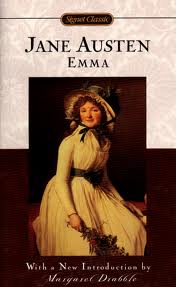Emma by Jane Austen
Reviewed by Ellen

Ratings Explanation
Violence: Harriet Smith is attacked by gypsies, but she is rescued by Frank Churchill.
Adult Themes: Wine is consumed at a Christmas party.
Synopsis
The novel opens with this line: “Emma Woodhouse, handsome, clever, and rich, with a comfortable home and happy disposition, seemed to unite some of the best blessings of existence; and had lived nearly twenty-one years in the world with very little to distress or vex her.” Having been brought up by an indulgent father and pampering governess, Emma’s worst character traits are “the power of having rather too much her own way, and a disposition to think a little too much of herself.” But in all else, Emma is a charming, witty, and blundering protagonist who intends never to marry herself but seeks to play matchmaker for those around her with some unpleasant and unintended results. When Emma befriends a lovely young woman named Harriet Smith, her intentions are fairly virtuous (if not a little meddling). Deciding that Harriet would make an ideal wife for someone, she casts her net and, unintentionally a spell, on Mr. Elton, who consequently falls for Emma instead of Harriet. Unraveling one mess gets her into another, as Harriet then falls for the handsome, gentlemanly Mr. Knightley–much to Emma’s chagrin, who realizes with Harriet’s announcement that she herself has been subconsciously in love with Mr. Knightley for some time.
Emma is the most light-hearted and comical of all of Jane Austen’s works. There are no shocking elopements or randy villains who leave young girls’ reputations in ruins. The most scandalous thing to happen is when Emma insults the over-chatty Miss Bates at a picnic and is chastised severely by Mr. Knightley. Although Miss Austen created in Emma a character she felt no one but herself would much like, precisely the opposite happens. She is endearing and clueless. When Emma thinks she might be in love with Frank Churchill, she says to herself: “This sensation of listlessness, weariness, stupidity, this disinclination to sit down and employ myself, this feeling of every thing’s being dull and insipid about the house! I must be in love. Well!” Also delightful is Mr. Knightley’s cheeky counsel to her: “Upon my word, Emma, to hear you abusing the reason you have is almost enough to make me think so too. Better be without sense than misapply it as you do.” This novel is somewhat long (my copy is nearly 450 pages), but makes a nice introduction to Austen for those who haven’t already devoured Pride and Prejudice. A good choice for high schoolers needing a change of pace from vampire-drenched novels.







